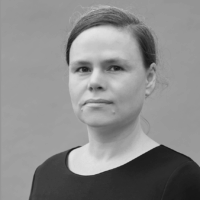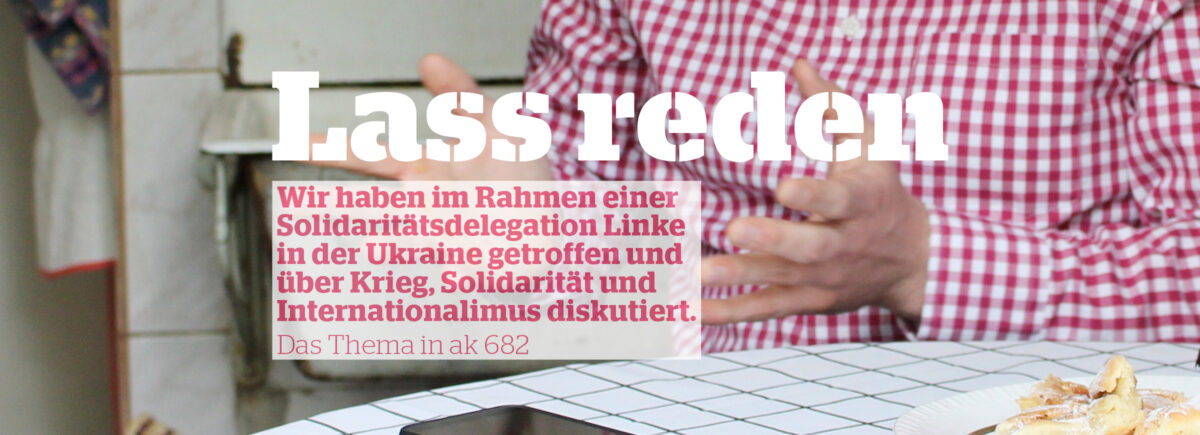In the Grinder of Geopolitics
Leftists in Ukraine long for international exchange – what else do they want? A visit to socialists, anarchists, trade unionists and feminists in Lviv
Von Jan Ole Arps, Sebastian Bähr und Nelli Tügel
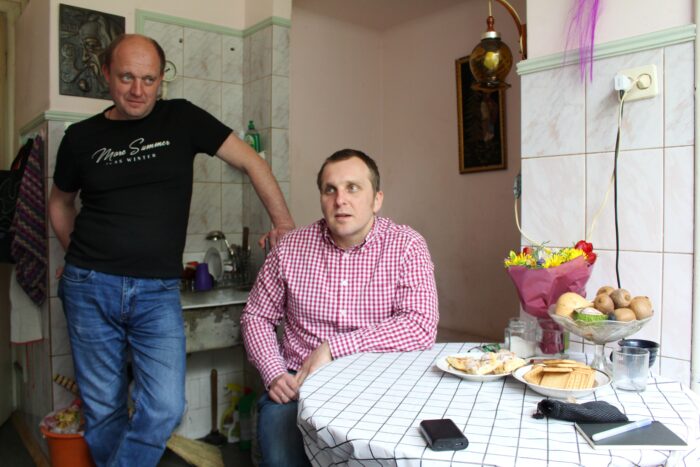
On a mild spring evening in early May, the sirens howl over Lviv. We are standing outside a bar in the centre of the city, where we have just had a beer with Swiss Trotskyists, British trade unionists and activists from Ukraine’s small leftist scene. It is getting dark, but the streets and squares are still full of people. Most ignore the air alert. “It is very important that this internationalist delegation is taking place. It really means a lot to us,” says Vitaly Dudin, one of our hosts and a board member of the leftist organisation Sotsialnyi Rukh, Social Movement, whose roughly 100 members are spread across a handful of cities. “We understand ourselves as internationalists, and we really miss the exchange with leftists from other countries.”
Lviv, not far from the border with Poland and traditionally a stronghold of Ukrainian nationalism, is currently one of the safest places in the country, even though three nearby substations were hit by Russian missiles the night before. Around 200,000 internally displaced persons from all parts of the country have sought shelter in the city in recent months. Hundreds, if not thousands, of journalists from all over the world are also staying here. On the day of our arrival, the Angelina Jolie is in town, on the day of our departure Bono is supposed to come; a steady stream of NGO workers and politicians meet here. But even though Lviv and now also Kyiv can hardly save themselves from foreign visitors, since the beginning of the Russian invasion on 24 February there has not been what actually seems so obvious: that a delegation of left-wing activists, parliamentarians and trade unionists would travel to the country, which Ukrainian men between the ages of 18 and 60 are no longer allowed to leave, in order to meet trade unionists and activists of the social movements there, on the spot.
We are internationalists and we really miss the exchange with leftists from other countries.
Vitaly Dudin, Sotsialnyi Rukh
That would be obvious because it is a basic idea of left-wing internationalism to process what is happening in the world in joint discussion, across borders, and to develop positions on it. It should also be natural to stand by the side of the working class and the oppressed who are struggling in a country where it is not easy to be a leftist and which is being invaded by an imperialist state. Ukrainian leftists, as well as leftists from other Central and Eastern European countries, have already written letters, threads and texts to the Western left, expressing their need for exchange, contact, networking and solidarity. Hardly anyone has written back.
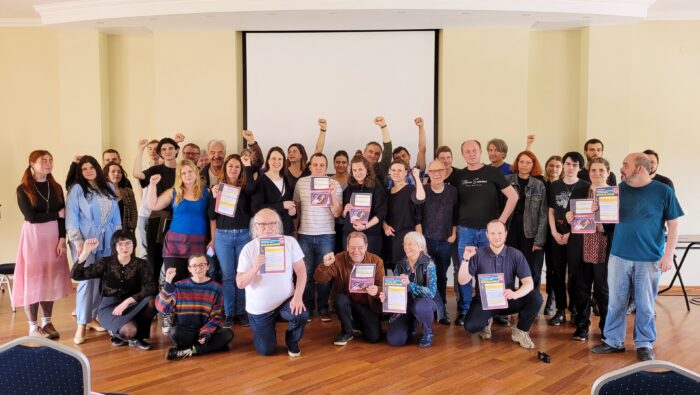
Now, around two dozen trade unionists and socialists from nine European countries and Argentina have accepted the invitation of the European Solidarity Network with Ukraine, a spontaneous association mainly from the Trotskyist spectrum. The tour group is led by Hanna Perekhoda, a PhD-student from Donetsk who lives in Lausanne. A few members of parliament are also present. Søren Søndergaard, who sits in the Danish parliament for the red-green Enhedlisten, the Finnish MP Veronika Honkasalo from the Left Alliance involved in the government there, Paulina Matysiak from the Polish left party Razem and Stefanie Prezioso, member of Ensemble à Gauche in the Swiss parliament. Likewise, Mireille Fanon-Mendès-France, president of the Fondation Frantz Fanon Internationale named after her father. One could say: it’s pretty late for a trip like this, more than two months into the invasion. One could say: Two dozen participants are not a lot, considering that Western Europe is close and large and that leftists there usually have many opportunities to travel. One could say: there are far more prominent leftists than those who have come here. But Vitaly Dudin says: “For us, this is a huge step.”
Are aid supplies ending up on supermarket shelves?
Dudin is a labour lawyer who earns his living in the communications department of a public agency. He also advises workers on how to assert their rights and trade unions on how to fight union busting. He came to Lviv from Kyiv for these days in early May. Others have also made their way to the city near the border to attend the two-day conference organised by Sotsialnyi Rukh and the European Solidarity Network. The activists and trade unionists come not only from Kyiv, but also from Uzhgorod in Transcarpathia, in the far west of Ukraine, where Russian missiles also hit the day before, or from even more distant places such as Kharkiv, Mariupol, Dnipro or Crimea. Many of them now live as internally displaced persons in Lviv.
The war has turned the lives of all present upside down and determines their political work. This becomes clear when trade unionists report on the first day: Train drivers like Aleksandr Skiba from Kyiv are now transporting refugees or humanitarian aid across the country. However, the aid that comes to Ukraine in large quantities does not always end up with the people, but often on the shelves of large supermarkets. “We have not yet been able to prove that the aid got there illegally, we have contacted the local authorities but have so far received no answer,” says Skiba.
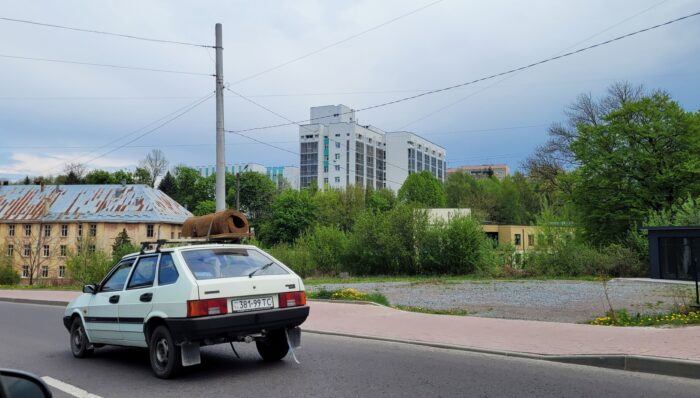
It’s not the only problem Skiba and his union, the Free Trade Union of Railway Workers (VPZU), are currently struggling with. Many colleagues have lost their homes due to bombs and shelling. Getting aid is difficult: “The state pushes everything onto local authorities, but they probably don’t have the money for it. So the government will say they did everything, and the local authorities will say they have no money because the government hasn’t given them any.” Skiba wants to take up the fight with the authorities to get support for his colleagues. Myroslava Kaftan of the Independent Miners’ Union of Ukraine from Chervonograd, near Lviv, also reports on the assumption of state tasks in caring for refugees, some of whom trusted the union more than the state.
A state that in recent years, despite all the promises of President Volodymyr Zelensky, who was elected by a large majority in 2019, has not been able to improve the living conditions of most people. Vitaliy Dudin reports that employees are often not paid their wages, which are often very low anyway; employers owe a total of four billion hryvnia (around 140 million euros) to “their” employees, with half of these wage debts affecting the public sector and state-owned companies. The already miserable conditions have been drastically worsened by the new war, explains Dudin.
Martial law and party bans
In addition, martial law and the recently enacted Law No. 2136 now apply. Many workers’ rights that existed at least on paper have been suspended, for example the right to regular wages. Strikes were rare in previous years, but are now completely banned. Inspections of workplaces by the state labour inspectorate no longer take place.
Before the war, Sotsialnyi Rukh opposed the deregulation policy of the Zelensky government; now the group criticises the restrictions imposed by martial law and the lack of a welfare state, which makes it even harder for those who already struggle to make a living. It is necessary to take up the fight against the powerful oligarchs and for radical social reforms, such as the nationalisation of the most profitable and strategically important companies and the taxation of the rich, Dudin says. The Sotsialnyi Rukh activists also emphasise that a debt cut is urgently needed, and they demand that their government stop servicing the foreign debt.
Russia presents itself as the last bastion of Christian values, says Ksenia, who has a Satan-loves-you tattoo on her temple.
Denis Pilash, also from Sotsialnyi Rukh, explains that the group opposes the government on social and democratic issues. The group not only rejects the restriction of workers rights under martial law, but also criticises the banning of a number of parties. In mid-March, eleven organisations were banned from their activities for the duration of the state of war on charges of collaborating with Russia, including smaller groups, but also the Union of Left Forces and the Opposition Platform for Life, which has 44 seats in parliament. For the most part, these parties are in the tradition of the left and workers’ movement in name only, Pilash explains. According to Pilash, they are pro-Kremlin, nationalist and reactionary organisations that use socialist and communist symbolism. However, the state ban and repression are not the right way, says Pilash – also because the criminalisation of socialist symbols always threatens to be directed against the left in general. The activists reject any discrimination based on language, origin or nationality, as well as the decommunisation law passed in 2015, which bans “totalitarian symbols”, including Soviet symbols, on the basis of equating communism and National Socialism.
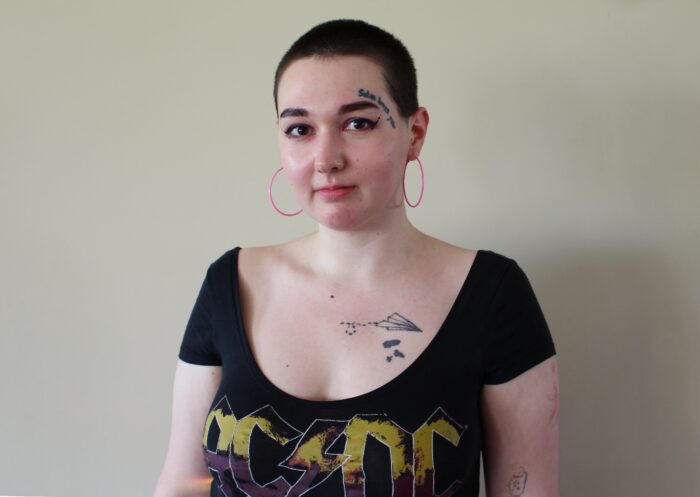
Despite all the criticism leveled at the government, they support it in the defence against the Russian invasion. The alternative would be a Russian occupation of the country – a disaster from the point of view of all our interlocutors. For the leftists gathered in Lviv, there is simply no alternative to the military defence of Ukraine. Activist Ksenia from the Queer Lab collective says that in some cities occupied by Russian troops, known queer activists are arrested or “disappear”. Even though the situation for queer people in Ukraine is not bright at all, the fear of falling under Russian occupation is huge in the community, as homophobia is also part of official ideology in Russia and “homosexualism” is forbidden. Russia presents itself as the “last bastion of Christian values” in Europe, says Ksenia, who has a “Satan-loves-you” tattoo on her temple. The members of her group donate half of their income to the Territorial Defence. They decide collectively to which units the donations go.
Where are the pacifists?
Statements like these cause uneasiness, if not rejection, among many leftists in the west – which in turn, Ukrainian leftists do not understand. Calls from leftists in Europe, such as mass desertion from the armed forces, laying down arms immediately, driving out the invaders by pacifist methods only or immediate unconditional negotiations, cause irritation – at best.
Are there no pacifists in Ukraine? In the past few months, statements by Yurii Sheliazhenko have have repeatedly surfaced. The researcher lives in Kyiv and is the chairman and, according to those present in Lviv, the only member of the Ukrainian Pacifist Movement. In online videos, he spoke out against the war, but also against the armed defence of the country. The videos achieved some circulation among leftists and peace activists in Western Europe: as an example of a different voice from the Ukrainian left.
“Sheliazhenko, a leftist?” Denis Pilash’s eyebrows rise when we ask him about it on the evening of the second day. “I can say two things about that: first, Yurii Sheliazhenko is a loner who has no connection with the left. He’s not someone you would meet at left-wing events. And secondly, he doesn’t even describe himself as left-wing.” Personally, Pilash says, he can’t think of anyone from the democratic and socialist left who opposes armed defence against the Russian invasion. All anarchists he knows are also clearly in favour of military resistance to Russian aggression.
We currently don’t have the luxury of being 100 percent pacifists.
Yuri Chernata, Operation Solidarity
Serhii Movchan from the group Operation Solidarity is one of them. Anarchists and anti-authoritarians have put up the initiative, they collect donations for left-wing activists in Ukraine, for the support of refugees and people in need, for military protective equipment. Around 100 anarchists and other leftists who have joined the Ukrainian territorial defence forces benefit from their support. “There is no discussion, there is a consensus about the Russian invasion and the need to resist it,” Movchan confirms Pilash’s assessment. Of course, not everyone is willing or able to fight with weapons themselves, Movchan says – but he emphasises the broad consensus within the scene that armed resistance is the most important form of defence at the moment. “With a military defeat of Ukraine, all other forms of activism would no longer make sense, a political life as we know it would no longer be possible,” says Movchan. He emphasises that some Ukrainian anarchists do reject the military under normal circumstances, but tyou have to adapt your practice to reality. Yuri Chernata, also part of Operation Solidarity, adds: “We currently don’t have the luxury of being 100 percent pacifists.”
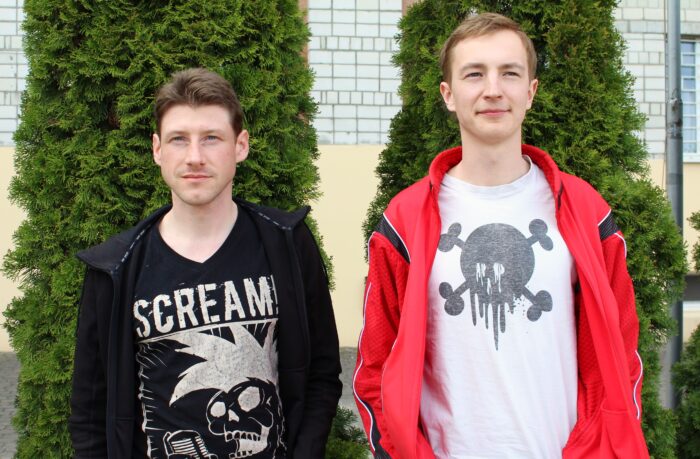
“Some foreign leftists said we should rather turn our weapons against our rulers and start the revolution,” Serhii Movchan says with a weary smile. “Yeah, how about you guys get startet? And when weapons are then turned against the Kremlin in Russia too, we’ll be happy to talk again, then we’ll surely follow your example.”
Movchan’s bitter words bear witness to a widespread dilemma: the position of many leftists abroad can be described as “no war but class war” – but what does that mean in view of the weakness of the left in many countries? The theoretically correct motto “The main enemy is at home” seems to serve some as an excuse not to have to enter into exchange – also dispute – with comrades in Ukraine, whose demands for military defence and arms supplies make leftists in the west feel uncomfortable.
NATO’s left-wing auxiliaries?
Taking a stand, showing solidarity with Ukrainian leftists does not mean ignoring the numerous problems and contradictions: The danger of a further escalation of the war is real, and the fear of being used for the war goals of the NATO states is justified. There is no reason to gloss over the situation in Ukraine, as the rulers in Paris or Berlin do, using phrases of “freedom” and “democracy” to turn the country into a frontline state for their EU nationalism. The strong support among Ukrainian leftists for armed defence means temporary integration into the structures of a state run by a neoliberal government, whose army also includes extreme right-wing units such as the Azov regiment. The far right could be strengthened by the war, politically as well as militarily. On the other hand, there is the threat of being occupied and dominated by a repressive imperialist power. From the point of view of everyone with whom we spoke, this is clearly the greater danger at the moment.
There are no illusions among left-wing activists in Ukraine about their own government or the NATO agenda. “Of course NATO has its interests in Ukraine,” says Movchan. Nevertheless, the war was started by Russia, it was not chosen. “If you are really a leftist, then listen to people on the ground and try to understand that Ukrainians have their own subjectivity,” says Movchan.
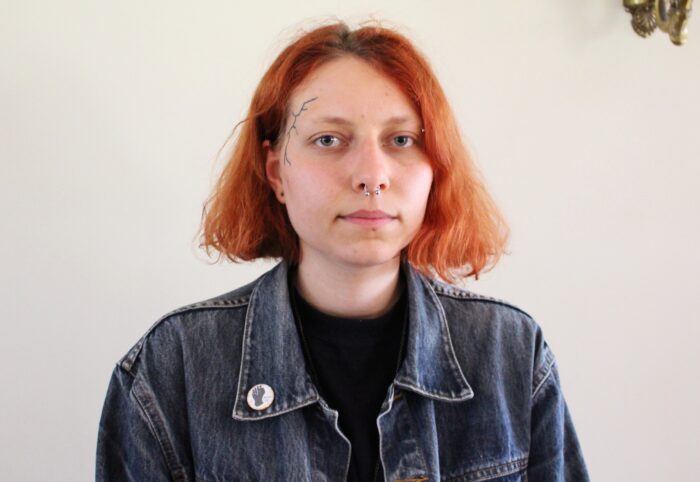
It is not the first time that a left’s geopolitical perspective has resulted in ignorance and denied subjectivity of the people on the ground, degrading them to pawns. Even when a workers’ uprising shook Kazakhstan at the beginning of the year, some immediately suspected an ”external” attempt to curtail Russias sphere of influence and looked at the insurgents with scepticism. From such a point of view, Ukraine is only the battlefield on which two imperialist blocs are fighting their struggle; the people living there are thus condemned to passivity.
The indifference of many foreigners to the effects of the war hurts activists in Ukraine, especially given the gross human rights violations that have already been committed. “At first you couldn’t believe that this was real – it looked like a post-apocalyptic computer game,” Serhii Movchan recalls. The anarchist visited Bucha, Irpin and Borodyanka, places where the Russian army committed atrocities against the civilian population. In conversations with residents, he says, the scale of the horror became clear. “It is absurd to claim that the massacres were staged by the CIA or something. You can’t manipulate all these people in the villages, then they would all have to be actors.” In theory, he could understand how people come to such positions. “But when someone actually says something like that in a discussion, I get angry,” says Movchan.
Danger of national closing of ranks
But doesn’t the war bring with it the danger of growing nationalism and the already weak left’s closing of ranks with the government? And what about the attacks and assaults committed by armed nationalists against Roma or non-white refugees?
“Yes, they exist,” says Julian Kondur, a Roma rights activist from Kyiv. In early March, pictures of young Roma tied to lampposts after being accused of shoplifting went viral. “Of course there is discrimination against us in Ukraine. For example, it is much more difficult for us to travel to the west of the country,” says Kondur. At the same time, he emphasises that thousands of Roma are fighting in Territorial Defence against the Russian invaders. “I therefore hope that our position in this country will be better after the war.”
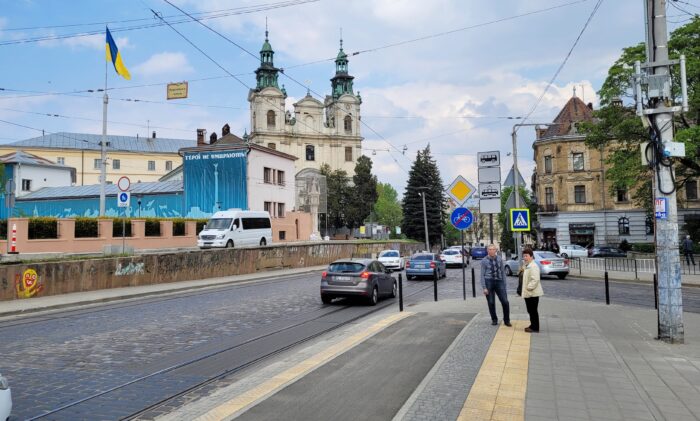
The far right, which did rather poorly in the last elections in Ukraine but is still a well-organised and powerful factor, is also hoping that the war will improve its position. The danger is real: what happens if the fascist units gain combat experience and prestige among the population? The leftists who gather in Lviv know the Ukrainian neo-Nazis well. Sotsialnyi Rukh did sometimes not announce events publicly in the past for fear of attacks, and in some years the group’s small May Day rallys had to be moved from Kyiv to Kryvyi Rih because of right-wing threats. For years, those gathered here have been attacked and also fought against the right-wing threat.
Quite a few leftists who have joined the Territorial Defence units or founded their own associations also refer to the experience of the Maidan uprising of 2014, when they had nothing to oppose the overwhelming power of the nationalist right. Back then, leftists were chased from the squares by nationalists or forced to put down their banners and leaflets if they wanted to stay with the protests. There was the massacre at the Trade Union House in Odessa on May 2, 2014, when after street battles between nationalist hooligans and pro-Russian Maidan opponents, the house where the Maidan opponents had taken refuge was set on fire; at least 48 people died that day. During this time, the extreme right had gained the reputation that it could be counted on to defend protests against police attacks. Not to be defenceless and powerless again is one of many left-wing motives to also take up arms this time.
War legitimises violence, it produces men who are used to violence, and this increases violence against women.
Marta Chumalo, NGO Women’s Perspectives
Denis Pilash says that it is frustrating when foreigners lecture them on the internet about Azov, when they are only interested in the extreme right in Ukraine or even call the group left-wing nationalists. The socialist emphasises that he and his comrades from Sotsialnyi Rukh see themselves as opponents of all imperialist powers. He is convinced that the fight against Russian imperialism, which they are currently forced to wage, can strengthen anti-imperialist forces all over the world – while a Russian victory would further weaken the international left. Most leftists we talk to also believe that Nazi groups will not benefit massively from the war. Compared to 2014, they played a minor role as a military factor today, they say. It remains a difficult question.
Hardening and pragmatism
Friday, May 6th, last day of the conference. In the block “Gender Dimension of War”, feminist activists and members of women’s rights NGOs report on the sexual violence that women have to endure in the course of the war. Yana Wolf from the feminist group Bilkis from Kharkiv, who, like all other members of her group, had to flee to Lviv, talks about the severe sexual violence against women in the occupied territories. Systematic rapes by Russian soldiers have been reported from many places, women become spoils of war, and the known cases were only the tip of the iceberg, as such horrors are difficult to talk about. The invading army aims to subdue and emotionally break the people in Ukraine, and that objective is being carried out on women’s bodies, Wolf says. But it is not only from the side of the aggressor that there is a growing threat of violence against women; in Ukrainian society, too, the war has intensified patriarchal violence and strengthened traditional gender roles.
Marta Chumalo, whose NGO Women’s Perspectives offers help and edvice to women in need and supports women in the labour market, confirms this. Chumalo reports a significant increase in domestic violence, not only fueled by the psychological stress of the bombings and the cramped space in the shelters, but also because many men were waiting at home to be called up to become warriors who would go to the front – and whose needs women are supposed to serve. The result, she says, is more verbal attacks and more violent behaviour towards women. “War legitimises violence, it produces men who are used to violence. We observe that this discourse increases violence against women,” says Chumalo. Reporting assaults has also become more difficult, she adds. When women report such incidents to the police, they often hear that there are more important things to do at the moment; the reporting women should please come back after the war. Her organisation tries to support women in need, to offer them a shelter, but they cannot meet the huge need for accomodation.
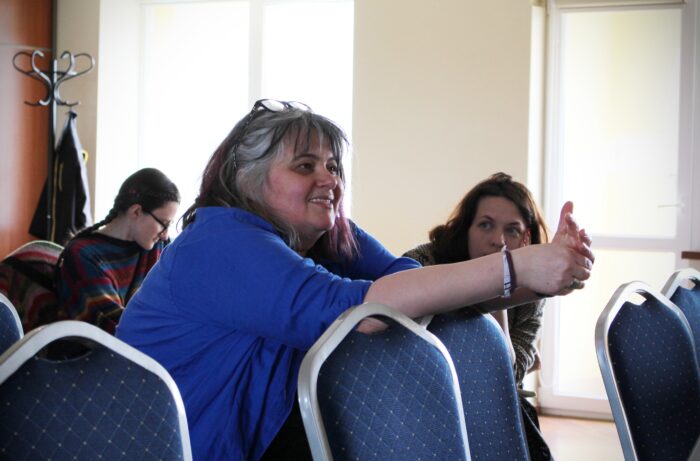
Abortions are also becoming more difficult, even after rape, says Yana Wolf. In Ukraine, there is actually a liberal abortion law that dates back to Soviet times. Abortions are legal up to the twelfth week of pregnancy, and possible up to the 22nd week under certain circumstances. But women are often put under pressure by their families or doctors not to have an abortion, Wolf says. The war provides the framework in which an anti-abortion discourse thrives. The appeals to women to produce offspring for the nation are increasing.
Wolf’s group also supports military defence against the Russian army. The Russian aggression has brought death, destruction, pain, fear and psychological devastation to Ukraine, says Wolf, it strengthens patriarchal, racist and ableist capitalist conditions, and it must be stopped. Wolf reports that an activist from the group has also joined the Territorial Defence Forces.
Not retreating to friend-foe-perspectives and keeping your hand outstretched is a tough challenge in times of war. Yana Wolf, wearing a patch in the Ukrainian national colors on her jacket, is asked during the conference wether her group had contact with Russian feminists. Her answer is no. And at the moment, she adds, she has no desire for it.
Railway unionist Aleksandr Skiba has a different approach. “As soon as we start declaring the Russian and Ukrainian people enemies, it will unite the Russians more behind the war,” the train driver believes. Even among the Russian soldiers in the occupied territories, he says, there are people who behave decently. In addition, many of them were disappointed that they are being burned as cannon fodder, friends who spoke with Russian soldiers told him. If one could “stir up” the demoralised soldiers and show them the truth, there might be a chance to end the war more quickly.
Skiba’s pragmatic optimism is refreshing, also in view of the hardening that can be observed under the impact of the horrors of war. This is precisely why it would be so important to start an exchange with the comrades in Ukraine. At the same time, a left anti-war policy requires that the search for opportunities for action from below not be dissolved in military thinking. Even if Skiba’s vision seems far away at the moment – if leftists in the west feel that commentary on the war from afar is not enough, if they do not want to sacrifice the search for left internationalist politics to geopolitical thinking, then it is high time to overcome passivity and establish contacts. At least in the Ukrainian left, the desire for this is huge.
The German version of this article was published on May 12.

